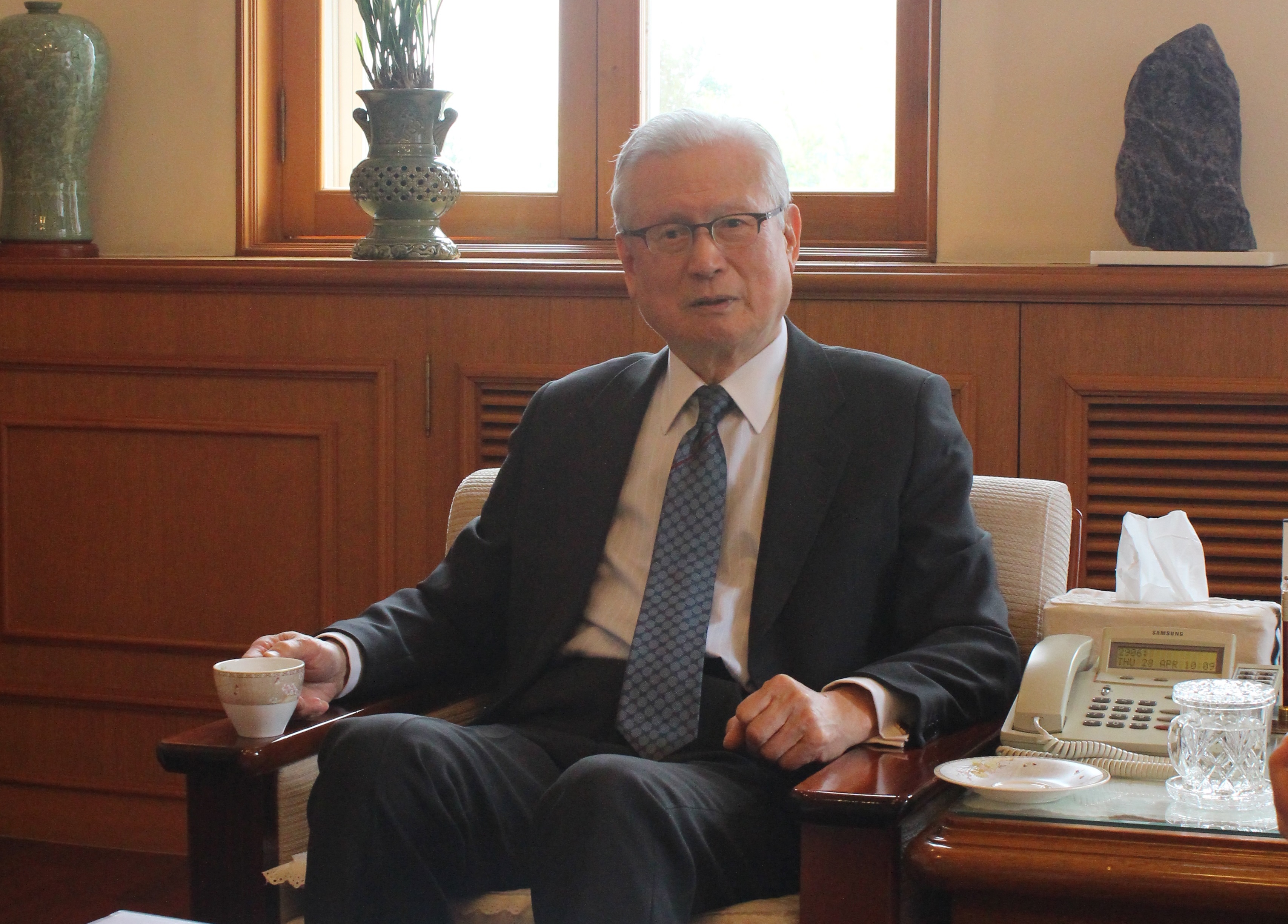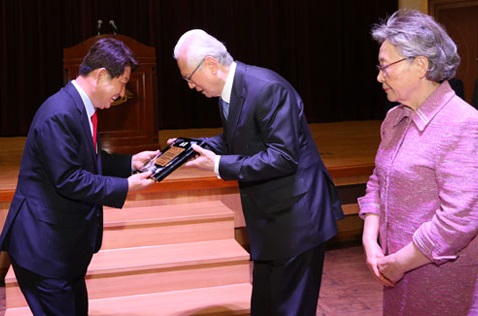
Keimyung University President Synn Ilhi has been an educator for 50 years. He received a Ph.D. in German literature from Princeton University in 1966. Afterwards, he spent time as a professor at the City University of New York for five years. When he came back to Korea, he became the first president of Keimyung University in 1978. His achievements are strict financial management and various nongovernmental diplomatic activities. There have been many events like a ceremony and an exhibition to celebrate his 50 years in academia since April. The Gazette covered these celebrations and interviewed President Synn. We will introduce President Synn’s educational philosophy, experiences, achievements, and the message that he would like to share with Keimyung University students.

● Events
Ceremony for President Synn Ilhi’s 50th Academic Jubileum
On April 22, a ceremony celebrating President Synn was held in Euiyang Hall.The ceremony included an introduction of President Synn’sachievements, congratulatory messagesfromthe mayor of Daegu, Kwon Young-jin, Gyeongbuk provincial governor Kim Kwan-young, and Daegu educational superintendent Woo Dong-gi, aspeech bythe president, and 3 celebratory performances.
50th Anniversary Exhibition for President Synn
From April 22 to May 28, a 50th anniversary exhibition was held in Hengso Museum. This exhibition had more than 100 exhibits that includedthe story of President Synn’s lifetime and awards for his nongovernmental diplomatic activities, like the Grand Cross of Poland and ofGermany. An art exhibition and a commemorative book publication are also being held to celebrate the president’s achievements.The art exhibition runs from May 24 to June 11 in Geukjae Museum, Daemyung Campus. Keimyung University professors and students have presented more than 60 art works. The commemorative book publication will be held on June 11 in Euiyang Hall.
● Interview with President Synn Ilhi
1. How do you feel about your 50th anniversary ineducation?
Fifty years as an educator means a lot to me. I have taught many students and helped them to prepare for the world after university. I think fifty years with many students is an invaluable time.
2. What do you like best about being an educator?
My grandfather was a scholar of the Chinese classics. He accepted Christianity, and he provided his sons with a modern education. For that reason, my uncle and father left Cheongju and came to Daegu to receive a higher education. Sometimes, I imagine them putting on straw shoes and climbing the hill called Nogwijae. When I image that scene, I am deeply moved. After that, my uncle became a minister, and my father became an educator. I think this environment gave me a vocation for teaching. I can also say it was hereditary. Thanks to them, I have been able to spend my life in university.
3. In your view, could you tell us what education is?
We can have a lot of different approaches to education. I think students become real people through education. The primary function of education is to prepare people for wider society. There is nothing in the world more rewarding than watching the development of students.
In addition, education may be compared to a tree. Trees grow well in favorable conditions. Sometimes, trouble happens because of various environmental factors. Like this, educators have an important role in guiding students along the right path. When students have a good education, they will be good people.
4. What for you is the most rewarding part of your job as an educator?
Education is not one person’s work. Many people work and cooperate with each other for a better education. I feel rewarded when all the members of the University cooperate with each other and accomplish our goal. For example, many educators and members of society reclaimed the wasteland which is the present Seongseo campus. We tried to make a more complete educational environment. Seongseo campus was not the work of one person. Many people helped to establish the campus. Therefore, students must not thoughtlessly throw away garbage like cigarette butts on campus. Such behavior is a blot on their achievement.
5. What is your opinion on overcoming today’s university crisis in Korea?
Today, Korean universities are suffering from two big problems. First, there is the management issue in university. We have to find excellent professors and hire them for a better education for students, despite the lack of budget. However, we also have to respond to social issues like freezes on tuition. Therefore, we cannot but have a tight financial policy. Second, there is the problem of creativity in our society and universities. In order to solve these problems, students’ pioneering and adventurous spirit is more important than anything.
6. What is Keimyung University’s identity?
“Tabula Rasa: When we have our face.” This is Keimyung University’s educational principle. Tabula Rasa means a blank paper on which nothing is written. Students enter the University as imperfect people, but they can become real people through education and various activities in Keimyung University. In addition, our university doesn’t aim to become the best. The best will not last forever. We have to be a unique university rather than the best.
7. KMU has established sister-school relationships with overseas universities and signed exchange agreements with other educational institutions abroad. Why is Keimyung maintaining relationships with overseas universities and signing exchange agreements?
Keimyung University puts a premium on the globalization of the campus. They have their own educational principles and methods in a different environment from ours. We can look forward to exchange not only in education but also cultural exchange through interaction with other countries’ universities. In addition, there are many programs that attract overseas students’ attention and help Keimyung students have foreign language ability and understanding of other countries’ cultures. I hope many students participate in these programs. We will learn from foreign art and culture. In addition, we will try to introduce Korean literature and traditional culture. For instance, Keimyung University’s Global Volunteers have done overseas volunteering activities.
8. Keimyung Universityis noted for its scenic beauty. Can you explain the various sculptures on campus?
There are many sculptures on our campus. Each sculpture has a different meaning. In particular, we can easily find statues in animal form. For example, there are two lion sculptures located in front of the Main Administration Building. One sculpture looks out from the campus. This lion protects the university and its students. Another sculpture looks into the campus. This lion reminds us not to settle for the present and to make efforts to improve. In addition, there is a stone in front of the Main Administration Building. It is called “Lapis Lazuli.” This stone is our university’s stone. It is light blue. Blue is the color of wisdom, and it is related to the University’s educational principle “For the Kingdom of Truth, Justice, and Love.”
9. What advice would you give to KMU students?
I hope students do not rely on someone else. Take care of your own business and plan your future by yourself. Your future is yours. You have to develop your own strength and have self-esteem. For instance, I acquired valuable experience when I graduated from middle school. I had just 100 dollars and went to the United States to study. However, I was short of money. Therefore, I worked on a farm, washed dishes in a restaurant, and worked as a construction worker for school expenses. At that time, I didn’t rely on anyone and I developed my ability to solve problems by myself.
One more thing is studying in university is important, but participating in various programs and enjoying leisure activities are as important as studying. As a student, don’t be afraid of trying new things. By doing these things, you will find your own true value.
Education is one of the most important things in society. President Synn Ilhi is an educator who has devoted his life to education. In addition, he is committed to working for Keimyung University and its students. Students should remember his advice and put it into practice.








